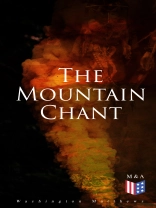‘The ceremony of dsilyídjeqaçàl, or mountain chant—literally, chant towards (a place) within the mountains—is one of a large number practiced by the shamans, or medicine men, of the Navajo tribe. I have selected it as the first of those to be described, because I have witnessed it the most frequently, because it is the most interesting to the Caucasian spectator, and because it is the best known to the whites who visit and reside in and around the Navajo country.’
Contents:
Myth of the Origin of Dsilyídje Qaçàl
Ceremonies of Dsilyídje Qaçàl
First Dance (Nahikàï)
Second Dance (Great Plumed Arrow)
Third Dance
Fourth Dance
Fifth Dance (Sun)
Sixth Dance (Standing Arcs)
Seventh Dance
Eighth Dance (Rising Sun)
Ninth Dance (Hoshkàwn, or Yucca)
Tenth Dance (Bear)
Eleventh Dance (Fire)
The Great Pictures of Dsilyídje Qaçàl
First Picture (Home of the Serpents)
Second Picture (Yays and Cultivated Plants)
Third Picture (Long Bodies)
Fourth Picture (Great Plumed Arrows)
Sacrifices of Dsilyídje Qaçàl
Original Texts and Translations of Songs, &c.
Songs of Sequence
First Song of the First Dancers
First Song of the Mountain Sheep
Sixth Song of the Mountain Sheep
Twelfth Song of the Mountain Sheep
First Song of the Thunder
Twelfth Song of the Thunder
First Song of the Holy Young Men, or Young Men Gods
Sixth Song of the Holy Young Men
Twelfth Song of the Holy Young Men
Eighth Song of the Young Women Who Become Bears
One of the Awl Songs
First Song of the Exploding Stick
Last Song of the Exploding Stick
First Daylight Song
Last Daylight Song
Other Songs and Extracts
Song of the Prophet to the San Juan River
Song of the Building of the Dark Circle
Prayer to Dsilyi’ Neyáni
Song of the Rising Sun Dance
Prayer of the Prophet to His Mask
Last Words of the Prophet
Giới thiệu về tác giả
Washington Matthews (1843-1905) was a surgeon in the United States Army, ethnographer, and linguist known for his studies of Native American peoples, especially the Navajo.












